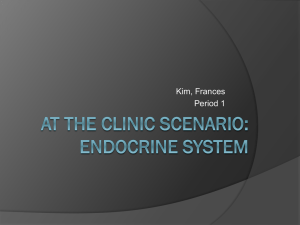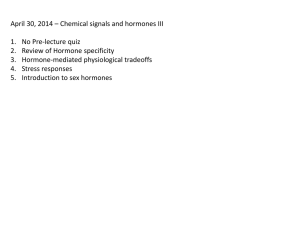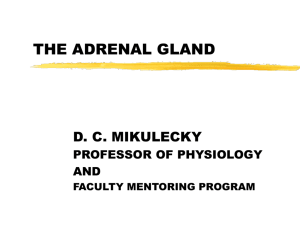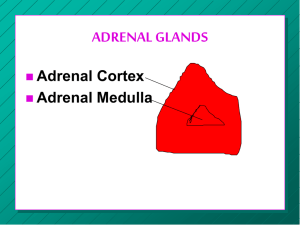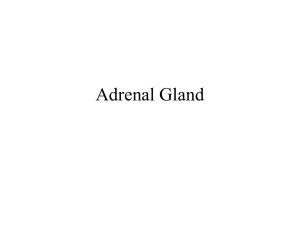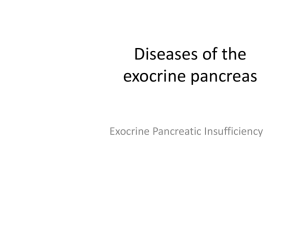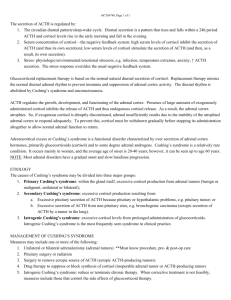ADRENAL GLAND
advertisement
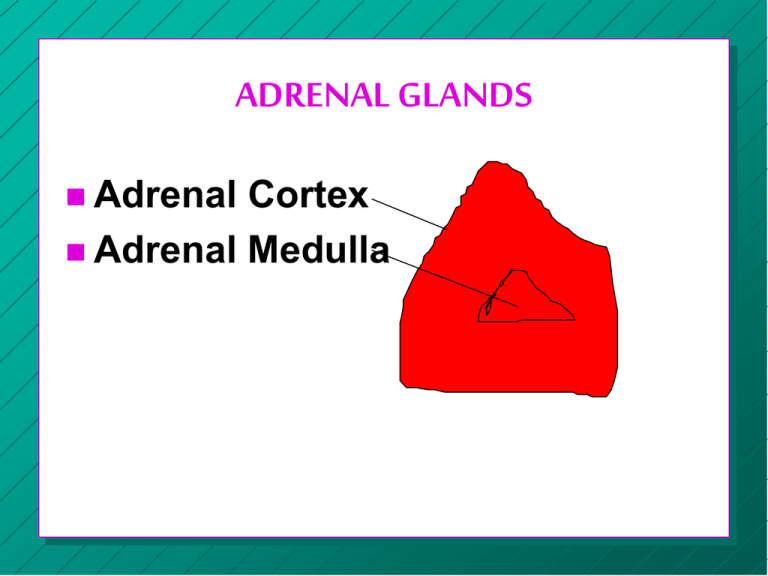
ADRENAL GLANDS Adrenal Cortex Adrenal Medulla ADRENAL CORTEX Salt Sugar Sex SALT Mineralocorticoids (F & E balance) – Aldosterone (renin from kidneys controls adrenal cortex production of aldosterone) Na retention Water retention K excretion Question: If your Na level is low, will aldosterone secretion or If your serum K+ level is high, will aldosterone secretion or SUGAR GLUCOCORTICOIDS (regulate metabolism & are critical in stress response) – CORTISOL responsible for control and & metabolism of: a. CHO (carbohydrates) – – amt. glucose formed amt. glucose released CORTISOL b. FATS-control of fat metabolism stimulates fatty acid mobilization from adipose tissue c. PROTEINS-control of protein metabolism – stimulates protein synthesis in liver – protein breakdown in tissues SUGAR Other fxs of Cortisol – inflammatory and allergic response – immune system therefore prone to infection SEX ANDROGENS – hormones which characteristics release male of testosterone Seen more in women than men RELEASE OF GLUCOCORTICOIDS IS CONTROLLED BY ______ LET’S LOOK AT ACTH (adrenocorticotropic Hormone) Produced in anterior pituitary gland ACTH Circulating levels of cortisol – levels cause stimulation of ACTH – levels cause dec. release of ACTH think tank: What type of feedback mechanism is this?? AFFECTED BY: Individual biorhythms – ACTH LEVELS ARE HIGHEST 2 HOURS BEFORE AND JUST AFTER AWAKENING. – usually 5AM - 7AM – these gradually decrease rest of day Stresssecretion cortisol production and ADRENAL MEDULLA Fight or flight What is released by the adrenal medulla? CATECHOLAMINE RELEASE Epinephrine Norepinephrine HYPER AND HYPOFUNCTION ADRENAL CORTEX HORMONES Too much Too little I. CUSHING’S DISEASE (TOO MUCH CORTISOL!) secretion of cortisol from adrenal cortex 4X more frequent in females Usually occurs at 35-50 years of age ETIOLOGY Cushing’s Primary-tumor on the adrenal cortex Secondary-tumor on the anterior pituitary gland Ectopic ACTH secreting tumor (lung, pancreas) Iatrogenic-Steroid administration SIGNS & SYMPTOMS Cushing’s protein catabolism – muscle wasting – loss of collagen support thin, fragile skin, bruises easily – poor wound healing SIGNS & SYMPTOMS Cushing’s s in CHO metabolism – hyperglycemia – Can get diabetes-insulin can’t keep up – Polyuria SIGNS & SYMPTOMS Cushing’s s in fat metabolism –truncal obesity –buffalo hump –“moon face” – weight but strength SIGNS & SYMPTOMS immune response – More prone to infection – resistance to stress – Death usually occurs from infection Before After What sign would the nurse identify in each patient? SIGNS & SYMPTOMS mineralocorticoid activity – ________ retention _______ retention – b.p. from ________ SIGNS & SYMPTOMS MENTAL CHANGES Mood swings Euphoria Depression Anxiety Mild to severe depression Psychosis Poor concentraion and memory Sleep disorders SIGNS & SYMPTOMS s in hematology WBCs lymphocytes eosinophils DIAGNOSIS of Cushing’s Serum cortisol levels What will serum cortisol levels be? Draw AT 8AM AND 8PM What would you expect? URINARY LEVELS OF STEROID METABOLITES. 17-OHCS (hydroxycorticoid steroid) 17-KS (ketosteroid) TREATMENT of Cushing’s Surgery transsphenoidal removal of pituitary tumor adrenalectomy-can be unilateral or bilateral if bilateral, need hormone replacement for life ectopic-try to remove source of ACTH secretion Cushing’s TREATMENT Radiation to tumors Palliative drugs – MITOTANE destroys tissue in adrenal cortex REVIEW: WHAT NURSING PRIORITY PROBLEMS WILL YOU EXPECT IN CUSHING’S? II. HYPERALDOSTERONISM “Conn’s Syndrome” Too much aldosterone secretion Question: What does aldosterone do???? _____________________________ usually caused by adrenal tumor SIGNS & SYMPTOMS Hyperaldosteronism Na and water retention – H/A, HTN K+ (hypokalemia) What is the normal serum K+ level??? Usually no edema DIAGNOSISHyperaldosteronism urinary K CT scan EKG changes plasma aldosterone levels with low plasma renin levels INTERVENTIONS Hyperaldosteronism BP -aldactone=Aldosterone antagonist so what will it do to Na, H2O, and K??? Correct hypokalemia/hypernatremia – K+ supplements; low Na diet Partial or total adrenalectomy ADRENALECTOMY PRE-OP Stabilize hormonally Correct fluid and electrolytes Cortisol PM before surgery, AM of surgery and during OR. ADRENALECTOMY POST-OP ICU-What type of problems to expect?? IV cortisol for 24 hours IM cortisol 2nd day PO cortisol 3rd day Poor wound healing If unilateral- steroids weaned – other adrenal takes over 6-12 months ADDISON’S DISEASE hypofunction of adrenal cortex What hormones will you have too little of??? glucocorticoids or _______ mineralocorticoids or _______ androgens or ____________ Trivia Question: Which famous President had Addison’s Disease??? ETIOLOGY of Addison’s Idiopathic atrophy –autoimmune condition Antibodies attack against own adrenal cortex –90% of tissue destroyed ETIOLOGY of Addison’s TB/fungal infections (histoplasmosis) Iatrogenic causes – adrenalectomy, chemo, anticoagulant tx SIGNS & SYMPTOMS Addison’s Disease fatigue, weight loss, anorexia – Why? think of cortisol fx Changes in skin pigment – small black freckles – cortisol -- ACTH-- MSH Muscular weakness – cortisol helps muscles maintain contraction and avoid fatigue SIGNS & SYMPTOMS Addison’s Fluid & electrolyte imbalances – WHY??? b.p. – WHY??? Hyponatremia-why? Hyperkalemia-why? Hypoglycemia-why? SIGNS & SYMPTOMS Addison’s androgens – hair loss, sexual fx mental disturbances – anxiety, irritability, etc. salt craving-why? DIAGNOSIS-Addison’s serum cortisol urinary 17-OHCS and 17 KS K, Na serum glucose INTERVENTIONS Addison’s Disease Life long hormone replacement – primary-need oral cortisone 2025mgs in AM and 10-12mg in PM – change dose PRN for stress – also need mineralocorticoid(FLORINEF) INTERVENTIONS Salt food liberally Do not fast or omit meals Eat between meals and snack Eat diet high in carbs and proteins Wear medic-alert bracelet kit of 100mg hydrocortisone IM INTERVENTIONS Addison’s Disease Keep parenteral glucocorticoids at home for injection during illness Avoid infections/stress COMPLICATIONS Addison’s Disease Adrenal crisis Electrolyte imbalance Hypoglycemia ADDISON’S CRISIS Sudden decrease or absence of adrenal cortex hormones which are: __________________ __________________ __________________ CAUSES Pt. with Addison’s who doesn’t respond to tx or has stress without dose Pt. with Addison’s but undiagnosed who is exposed to stress Pt. on steroids that are dc’d without tapering Pt. with Addison’s not controlled SIGNS & SYMPTOMS Addisonian Crisis DehydrationNa, K, BP N/V,diarrhea, wt. loss Weakness Confusion,headache Hypovolemic shock, coma Pallor, Inc. HR,RR, hypoglycemia Renal shut-down-DEATH TREATMENT Addisonian Crisis Rapid infusion of IV fluids Check VS and urine output frequently Monitor EKG Give solu-cortef IV Q6 hours until S & S disappear TREATMENT Try to anxiety May have to give vasopressors – Dopamine or Epinepherine Avoid additional stress PHEOCHROMOCYTOMA rare, benign tumor of the adrenal medulla oh no...what are we going to see a hypersecretion of???? SIGNS AND SYMPTOMS Hallmark is hypertension-200/150 or greater “Spells” -paroxymal attacks – bladder distension,emotional distress, exposure to cold. NE and Epinepherine released sporadically SIGNS & SYMPTOMS Deep breathing Pounding heart Headache Moist cool hands & feet Visual disturbances DIAGNOSIS 24 hour urine-VMA (metabolite of Epinepherine) Plasma CT catecholamines to locate tumor INTERVENTIONS-PRE-OP Adrenergic blocking agents – Minipress to Beta blocking agents – Inderal to bp hr, b.p., & force of contraction Diet – high in vitamin, mineral,calorie, no caffeine Sedatives INTERVENTIONS Monitor b.p. Eliminate attacks If attack- complete bedrest and HOB 45 degrees DURING SURGERY GIVE REGITINE AND NIPRIDE TO PREVENT HYPERTENSIVE CRISIS POST-OP b.p. may be initially, BUT CAN BOTTOM OUT Volume expanders Vasopressors Hourly I and O Observe for hemorrhage QUESTION?? What if you are not a candidate for surgery??? Demser (drug which inhibits catecholamine synthesis) Avoid opiates, histamines, reglan, anti-depressants. Why? Now Let’s Practice Some Questions….
